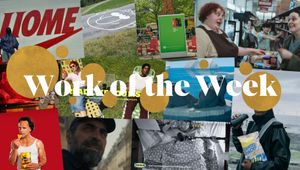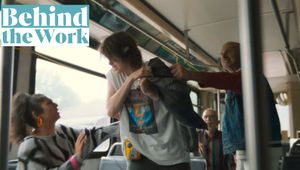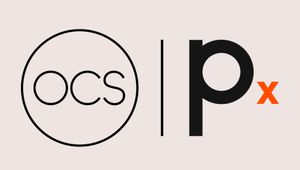
How This New Partnership Aims to Help Brands Create and, Importantly, Distribute Longer-Form Content

Brand New Story, a content advisory firm that helps brands create, market and distribute long-form entertainment, recently entered into a first-of-its-kind strategic partnership with Austin ad agency Bakery.
Brand New Story is a joint venture between David Gordon Green’s Rough House Pictures and producer John Sloss’s Cinetic Media, which produced the last seven Academy Award-winning documentaries — as well as movies like 'Boyhood' and 'Green Book'. While BNS has already worked closely with numerous creative agencies to bring client projects to life, this will be their first ongoing, strategic partnership.
Under the terms of this new deal, Bakery and Brand New Story will collaborate to provide select clients with full-service support spanning the entire value-chain of film and television, lending their shared expertise across early stage project development, production, marketing and distribution. The initial focus of the partnership will be on Bakery clients Shiner Beer and Nike. Bakery and Brand New Story will help these brands develop unique and engaging film and television, with a focus on distribution that will likely include streaming giants and other premium channels.
Even as some consumer and enterprise brands have begun to produce long-form entertainment, many have treated it as a stunt. Together, Bakery and Brand New Story believe they can ignite a paradigm shift in how brands create and distribute Hollywood storytelling, with programming that audiences will legitimately enjoy.
LBB's Addison Capper chatted with Jared Shulman, CEO of Brand New Story, and Micky Ogando, principal and chief creative officer of Bakery, to find out how and why.
LBB> To get going, how did this partnership come about? Brand New Story has worked with different brands and agencies before but what inspired this more formal partnership?
Jared> BNS has worked with some of the best creative agencies out there, and are very proud of the work we’ve released to date. Yet as we looked to find a long-term strategic partner, Bakery continued to rise to the top. Their holistic approach to storytelling, use of technology and pure passion for the artform is what really attracted us. From there conversations went fairly quickly as we all shared a similar aspiration to help our clients tell truly impactful stories.
LBB> Why is a partnership of this type important in the first place?
Micky> Creating for a brand, whether it's 30 seconds, six seconds or 190 minutes, is just as much an exercise in torture and politics as it is an artistic expression. Ideas and integrations must be generated, presented and executed in a very particular manner so they answer a brand's cultural and business goals. After all, most of the companies we work with don't sell movies. In order to make sure a film project doesn't die on the vine, it's necessary to have all the right heads and tactical skill sets in the room from the start of a project.
LBB> Thinking about the whole process from early stage development to distribution, what are the challenges and issues surrounding branded content creation?
Jared> Developing a feature film or television series can take time and patience, especially in the non-fiction and documentary space, where editors are often finding the story in post-production. Similarly, distribution requires time to establish a title in culture, build consensus and drive scale. This is in direct contrast to more traditional ad creation, which is entirely storyboarded before the shoot, has a more certain production period and a set launch date. It’s this uncertainty that’s often the biggest challenge for our clients. The solution however comes through preparation and education – ensuring all parties are aligned at the outset and have a full understanding of the filmmaking process.
LBB> And how does a partnership like this aim to help and fix those problems for brands?
Micky> To add to what Jared said, Brand New Story endows us with so much of what we traditionally lack. From film distribution and project structure to talent negotiation and residuals, they speak a language most in adland do not. Now if we want to present a long-form project with Hollywood talent that can live on a popular streaming platform, the headaches and obstacles have been removed for us and our clients.
LBB> One big issue for brands and longer form content is the distribution side of things. It's all well and good creating and producing something that people will enjoy, but not much use if nobody knows it's out there to see. Can you speak a bit more to that issue? And how brands can navigate that distribution world in a better way?
Jared> Traditional film distribution is an imperfect process - only once a film is completed is it then taken out to the market to assess interest, and hopefully score a sale. Knowing how challenging the uncertainty of this process can be for our clients, we often weave distribution into the development of the project, engaging the right release partners early on. Additionally, we’ve created a distribution model that relies less heavily on the sales and licensing market, rather allows the producer (in this case the brand) to ‘self-release’ which in most cases will still include exploitation on major streaming platforms, yet offers the brand more certainty and control of where their content lands.
LBB> Thinking about it, this sounds somewhat like a new-age media agency. It's all about placement, and so is the role of a media agency. What are your thoughts on that?
Micky> Bakery has always had a different relationship with media, seeing it as the distribution of story and message, not as a mathematical purchasing of inventory. Aligning with where people already are – in this case, entertainment giants – is exactly in line with what we have always chosen to do. That being said, I don't see the partnership as a new ‘agency’. It is simply an expansion of our non-traditional framework.
LBB> Is this partnership only open to Bakery clients or can other brands take advantage too?
Micky> This partnership has some very particular projects and goals in mind, some of which may not allow for other contributing entities to play a part. However, Brand New Story does and will continue to work with other forward-thinking groups outside of our bubble. We encourage it! The more we do to transform the industry and the role a creative agency plays in media and structure, the better off we will all be.
LBB> Looking forward six months or so, what do you hope to have achieved from this partnership?
Micky> We have some things we're working on now that we can't be too vocal about yet. All I can hope for is to continue to be the guy who makes his clients extremely uncomfortable and to be well into production on the very fun projects we're just kicking off now.
Photo credit: Jakob Owens on Unsplash















